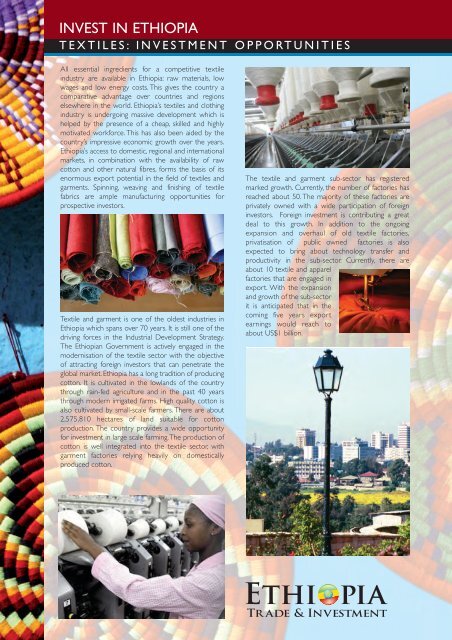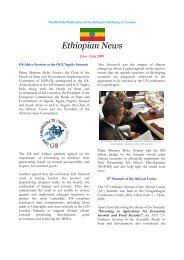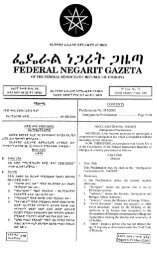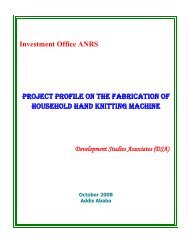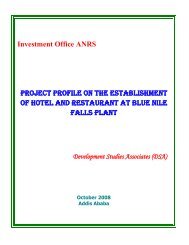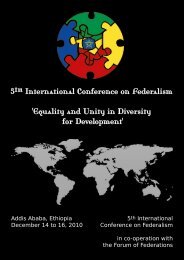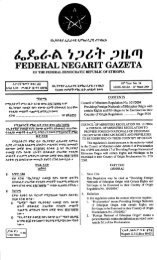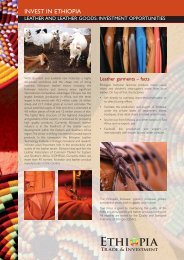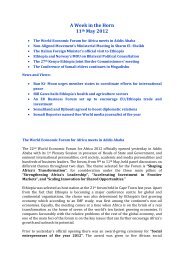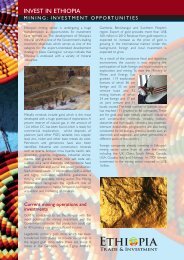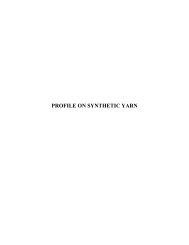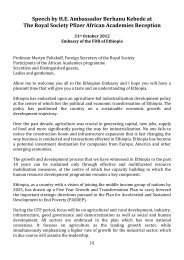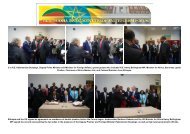Textiles
Textiles
Textiles
Create successful ePaper yourself
Turn your PDF publications into a flip-book with our unique Google optimized e-Paper software.
INVEST IN ETHIOPIA<br />
TEXTILES: INVESTMENT OPPORTUNITIES<br />
All essential ingredients for a competitive textile<br />
industry are available in Ethiopia: raw materials, low<br />
wages and low energy costs. This gives the country a<br />
comparative advantage over countries and regions<br />
elsewhere in the world. Ethiopia’s textiles and clothing<br />
industry is undergoing massive development which is<br />
helped by the presence of a cheap, skilled and highly<br />
motivated workforce. This has also been aided by the<br />
country’s impressive economic growth over the years.<br />
Ethiopia’s access to domestic, regional and international<br />
markets, in combination with the availability of raw<br />
cotton and other natural fibres, forms the basis of its<br />
enormous export potential in the field of textiles and<br />
garments. Spinning, weaving and finishing of textile<br />
fabrics are ample manufacturing opportunities for<br />
prospective investors.<br />
Textile and garment is one of the oldest industries in<br />
Ethiopia which spans over 70 years. It is still one of the<br />
driving forces in the Industrial Development Strategy.<br />
The Ethiopian Government is actively engaged in the<br />
modernisation of the textile sector with the objective<br />
of attracting foreign investors that can penetrate the<br />
global market. Ethiopia has a long tradition of producing<br />
cotton. It is cultivated in the lowlands of the country<br />
through rain-fed agriculture and in the past 40 years<br />
through modern irrigated farms. High quality cotton is<br />
also cultivated by small-scale farmers. There are about<br />
2,575,810 hectares of land suitable for cotton<br />
production. The country provides a wide opportunity<br />
for investment in large scale farming. The production of<br />
cotton is well integrated into the textile sector, with<br />
garment factories relying heavily on domestically<br />
produced cotton.<br />
The textile and garment sub-sector has registered<br />
marked growth. Currently, the number of factories has<br />
reached about 50. The majority of these factories are<br />
privately owned with a wide participation of foreign<br />
investors. Foreign investment is contributing a great<br />
deal to this growth. In addition to the ongoing<br />
expansion and overhaul of old textile factories,<br />
privatisation of public owned factories is also<br />
expected to bring about technology transfer and<br />
productivity in the sub-sector. Currently, there are<br />
about 10 textile and apparel<br />
factories that are engaged in<br />
export. With the expansion<br />
and growth of the sub-sector<br />
it is anticipated that in the<br />
coming five years export<br />
earnings would reach to<br />
about US$1 billion.
INVEST IN ETHIOPIA<br />
TEXTILES: INVESTMENT OPPORTUNITIES<br />
Markets and market access<br />
Major agricultural export<br />
products of Ethiopia include:<br />
coffee, livestock products<br />
(leather and leather products,<br />
live animals and meat), oil<br />
seeds and pulses, fruits,<br />
vegetables and flowers,<br />
textiles, natural gum and,<br />
spices products. Its agricultural<br />
export products have<br />
markets in neighbouring<br />
countries, Asia, the Middle<br />
East, Europe and America.<br />
Ethiopia is a member of a regional trade grouping - The<br />
Common Market for Eastern & Southern<br />
Africa/COMESA/ - a region inhabited by more than 420<br />
million people. Ethiopia also enjoys Duty Free and<br />
Quota Free (DFQF) privileges extended by, among<br />
others, USA – Africa Growth and Opportunity ACT<br />
(AGOA), EU – Everything But Arms (EBA), China –<br />
‘0 Tariff’ privilege and India – DFQF. The market accesses<br />
privileges allow investors engaged in the agriculture and<br />
agro-processing export sector of Ethiopia to reap the<br />
benefits of the preferential markets giving them the<br />
chance to get competitive edge for their products<br />
compared to those outside of the scheme.<br />
Investment incentives<br />
As noted on the investment code of 2002 (as amended<br />
in 2003) and Council of Ministers Regulation 2003(as<br />
amended in 2008) investors interested in the<br />
agriculture and agro-processing export sector will have:<br />
• Customs duty privilege for us capital goods and<br />
construction of materials necessary for the<br />
investment and spare parts whose value is not<br />
greater than 15% of the total value of the capital<br />
goods.<br />
• Tax holiday privileges between 2 to 7 years of<br />
which details will be provided by the Investment<br />
Board of Ethiopia.<br />
Investment guarantees:<br />
• The Constitution and the Investment Code protect<br />
private property,<br />
• Foreign investors are entitled to make the following<br />
remittances out of Ethiopia in convertible foreign<br />
currency: profits and dividends accruing from<br />
investment; principal and interest payment on<br />
external loans; payments related to a technology<br />
transfer agreement; proceeds from the sale or<br />
liquidation of an enterprise; proceeds from the<br />
transfer of shares or of partial ownership of an<br />
enterprise to a domestic investor; expatriate<br />
employees may remit, in convertible foreign<br />
currency, unspent salaries and other payments<br />
accruing from their employment in hard currency,<br />
• Investors that suffer losses during a tax holiday<br />
period provided under the investment incentive are<br />
also entitled to a loss carry forward of such losses<br />
for half of the income tax exemption period.<br />
• As a member of the World Bank Multilateral<br />
Investment Guarantee Agency (MIGA), World<br />
Intellectual Property Organization (WIPO), the<br />
International Convention on Settlement of<br />
Investment Disputes<br />
between States and<br />
Nations of other<br />
States (ICSID) and<br />
having Bilateral<br />
Investment Promotion<br />
and Protection<br />
Agreement with the<br />
UK, investors enjoy<br />
strong guarantees for<br />
their investment in the<br />
country.


